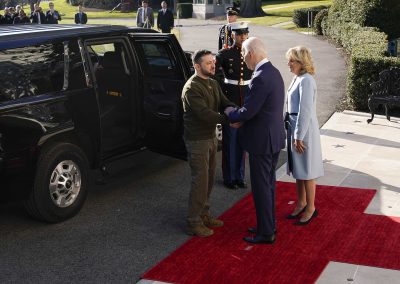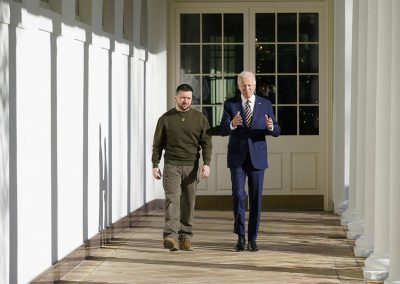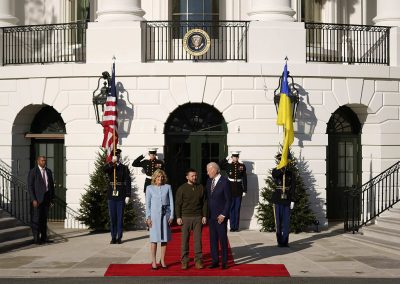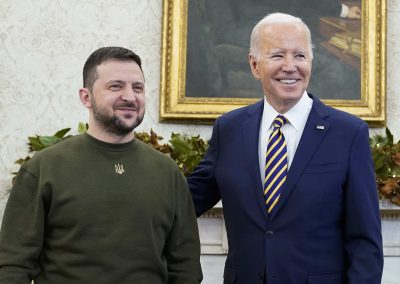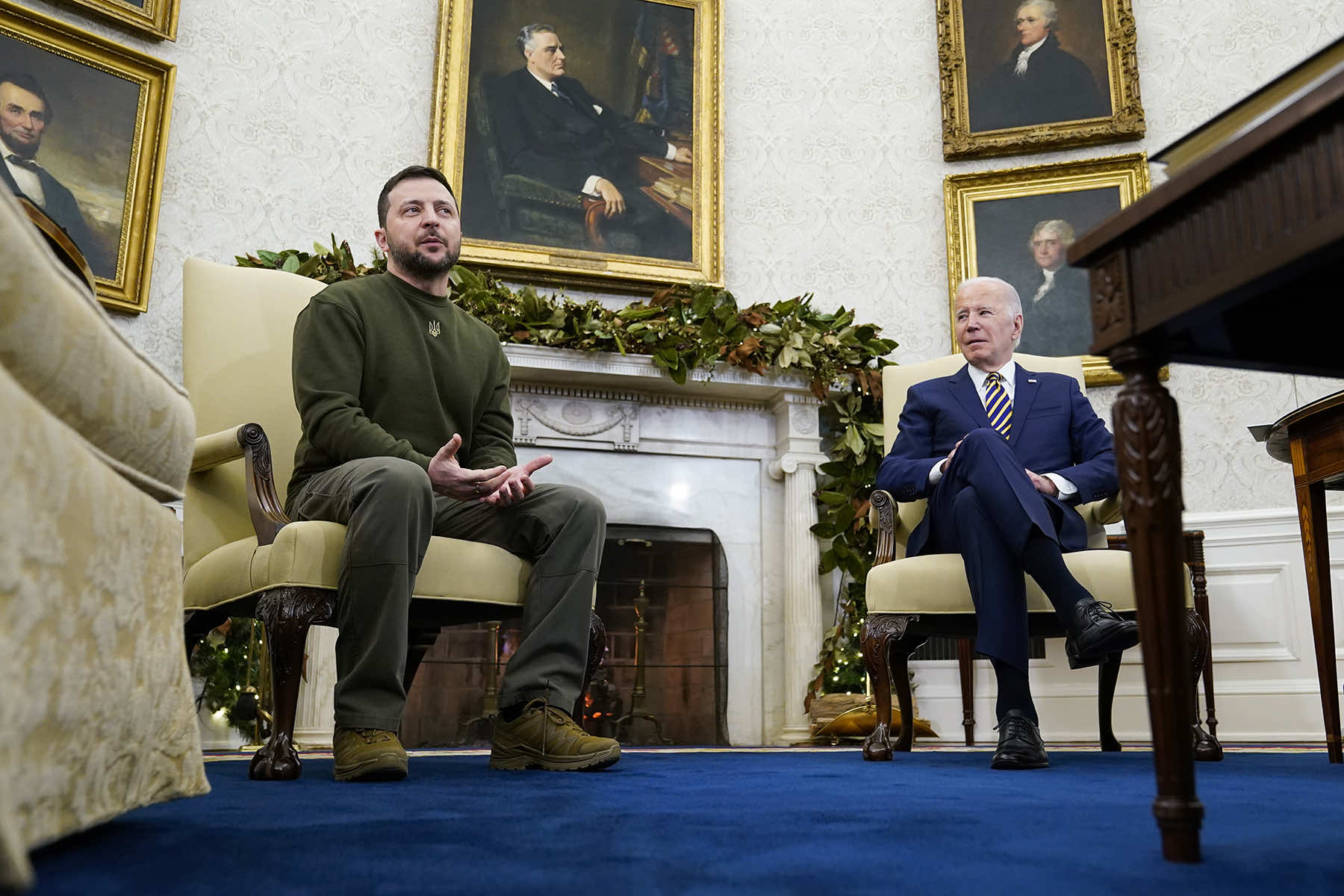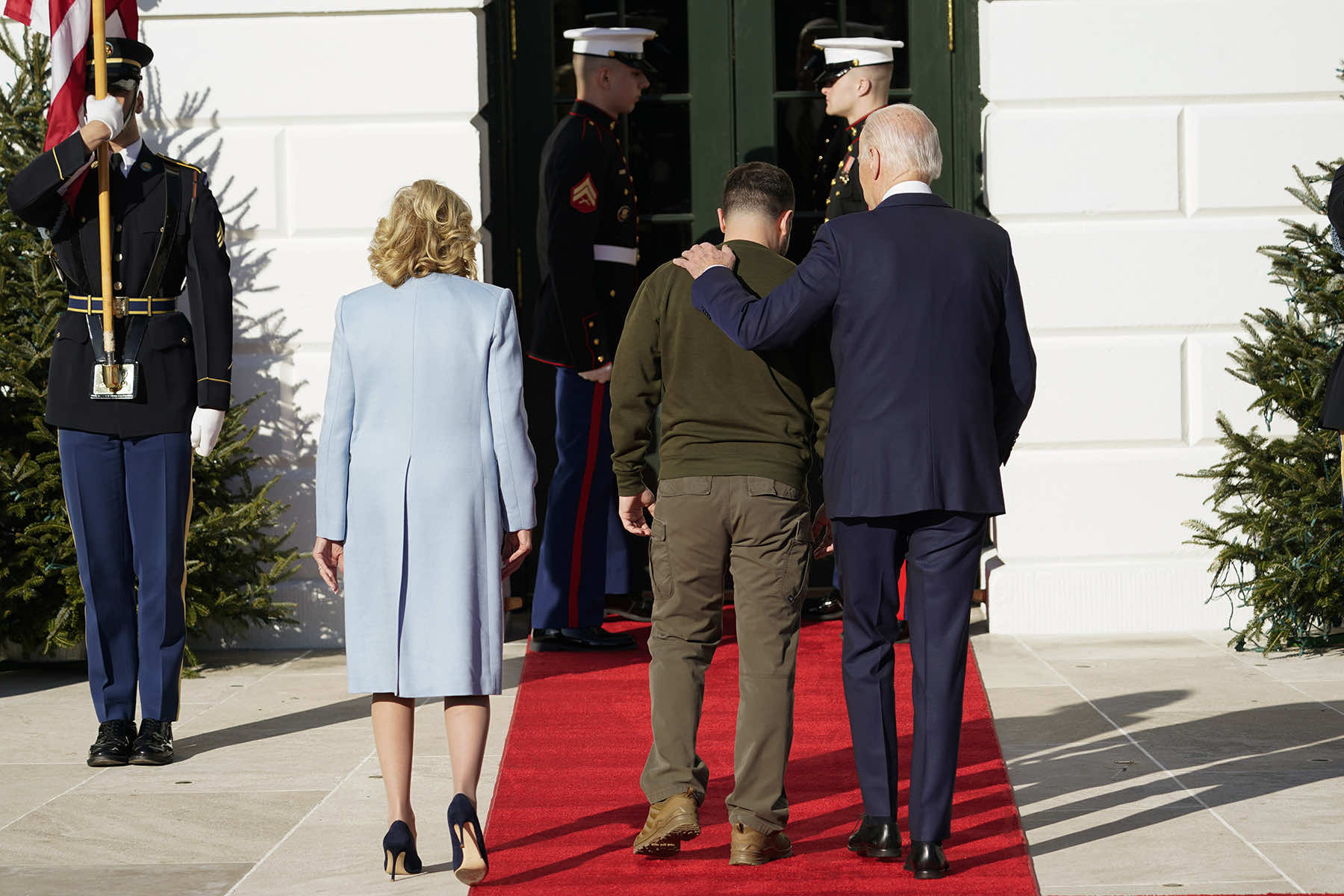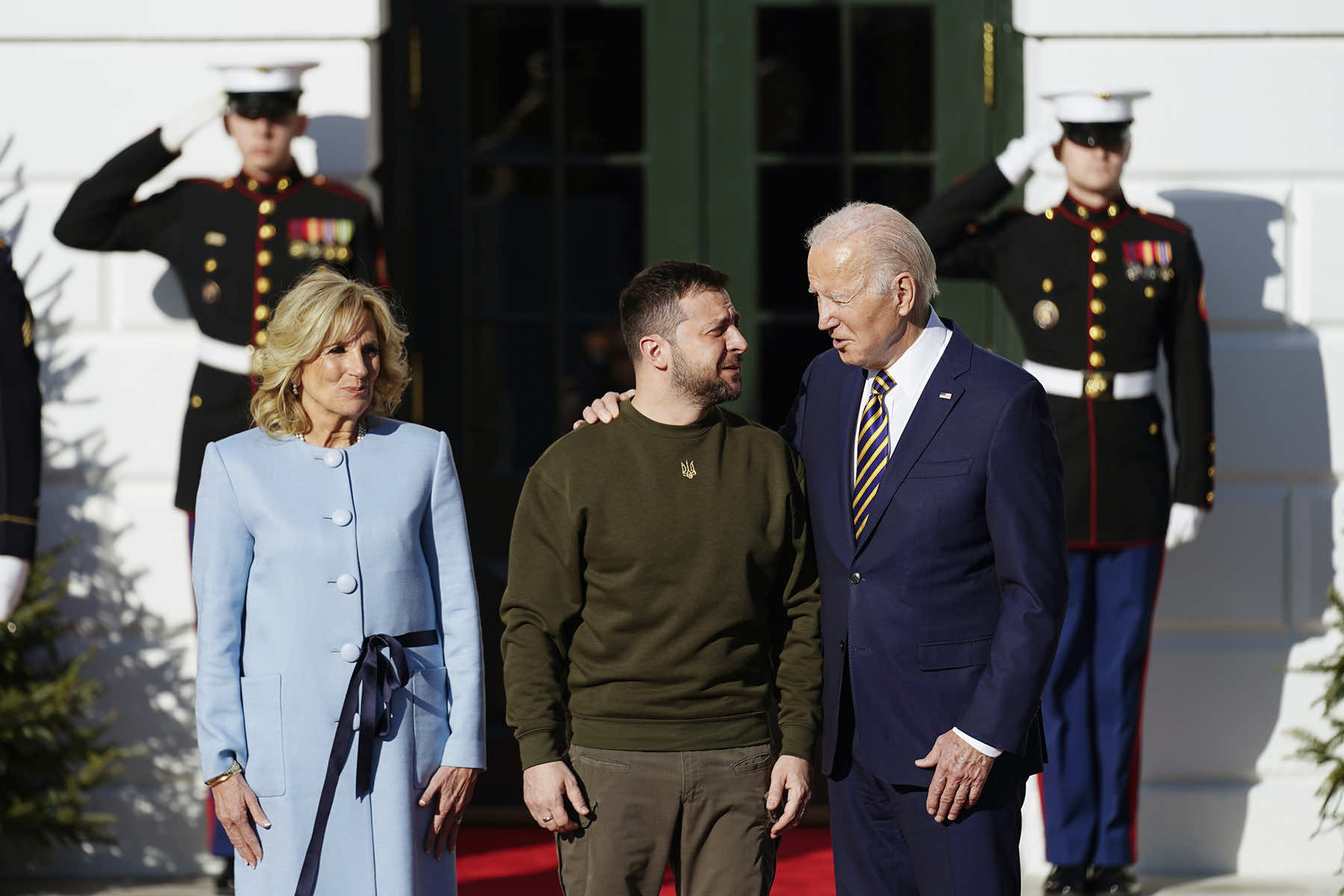
Ukrainian president Volodymyr Zelenskyy is visiting the United States today and speaking to a joint session of Congress.
He will be pushing back against those on both the extreme left and right who keep whining that in 1991 President George HW Bush said NATO would not expand toward Russia (a comment that was never reduced to writing and never part of any agreement) and the Minsk cease-fire Agreements, which President Putin declared on February 22 “no longer exist.”
Hopefully President Zelenskyy will remind Congress that America is party to an actual contractual agreement to protect the integrity of Ukraine’s borders, an agreement we signed to reduce the number of nuclear weapons in the world.
That is the “Budapest Memorandum” of 1994, an agreement worked out just three years after the Soviet Union dissolved and Ukraine had again become an independent nation.
Through much of that year the UK, US, and Russia met repeatedly with Ukraine at a venue in Budapest provided and blessed by the UN to try to secure and remove from Ukraine the world’s third-largest stockpile of nuclear weapons.
Ukraine, the largest country in Europe (about the size of Texas), had inherited from the old Soviet Union a massive collection of nukes, including almost two thousand SS-19 and SS-24 Intercontinental Ballistic Missiles (ICBMs), in silos scattered from border to border. Between 1991 and 1994, Ukraine owned the world’s third largest nuclear weapons arsenal.
Every one of those thousands of missiles had warheads containing nuclear bombs in the 400-550 kiloton range: each missile’s warhead was 27 to 37 times more powerful than the weapons we used to destroy Hiroshima and Nagasaki.
This Ukrainian stash of nuclear weapons was six times the size of what China has today, capable of destroying — both because of the missiles’ ranges and the size of the warheads — every town and city in the United States with more than 50,000 people, as The Brookings Institution noted, “three times over, with warheads left to spare.”
Most were pre-targeted at the United States, but those missiles — and the long-range jets and nuclear bombs Ukraine had as well — could just as easily have been repositioned to take out Moscow and every major population center in Russia, or every consequential city in Britain and continental Europe, with plenty of firepower left over.
The US, UK, and Russia — on behalf of the United Nations and the world — really, really wanted those nuclear weapons to be secured.
Ukraine was more than willing to give them up — particularly after being so traumatized by the meltdown of their Chernobyl nuclear power station in 1986 — so they entered the Budapest negotiations in good faith with only three simple demands.
First, they wanted an absolute assurance from, at least, the US, UK, and Russia that their territorial integrity would be both respected by those three nations and defended in the event of an invasion.
Second, Ukraine wanted some financial help to safely dig the missiles out of their bunkers and transport them to Russia for decommissioning and destruction. The job would cost more than Ukraine’s economy could bear at the time.
Third, they still had 15 functioning nuclear reactors operating in Ukraine, a legacy of the Soviet nuclear power program (which also provided some of the materials for those 1900 nukes), and the nuclear material in the warheads could be reprocessed into high-quality fuel for Ukraine’s power stations. They wanted an equivalent amount of nuclear fuel from the US, UK, and Russia so they could provide themselves with low-cost electricity for a few decades.
The three nations negotiating with Ukraine agreed to all the terms:
- Russia took most of the responsibility for relocating and decommissioning the ICBMs and their nuclear warheads, and providing Ukraine with nuclear power-station fuel.
- The US and the UK kicked in around $3 billion cash to cover the costs.
- And all three nations kicked in to an additional $3 billion fund to pay for a modern Ukrainian military, promised to never attack Ukraine, and to defend its borders if anybody else did.
Ukraine, trusting our word that their borders would never be violated, gave up their nuclear weapons. All of them.
We can all see how poorly that memorandum, signed in Budapest on December 5, 1994, has worked out.
So can children in Ukraine who are literally freezing to death as you read these words.
The memorandum doesn’t have specific language about exactly how the US, UK, and Russia would protect Ukraine and its borders in the event of an attack, but it was backed up by at least the appearance of the moral force of the United Nations.
It does, however, contain language that the Ukrainians were convinced would protect them. In it, the US, UK and Russia “reaffirm their obligation to refrain from the threat or use of force against the territorial integrity or political independence of Ukraine.”
The three nations and, by proxy, the UN, additionally promised to “refrain from economic coercion” against Ukraine and, should things break down, to “seek immediate United Nations Security Council action to provide assistance to Ukraine” if any nation were to initiate an “act of aggression” against Ukraine.
By 1996 Ukraine was completely denuclearized, weapons-wise, and until 2014 thought they were safe, as the country blossomed into a western-Europe-like vibrant regulated capitalist economy, having twice rejected attempts by political elites to corrupt the government as they built a sturdy middle class and a technologically modern nation.
When Russia annexed Crimea back in 2014, Ukraine went before the UN and, citing the Budapest Memorandum, demanded the world act to protect its territory from Russian aggression.
The world, not wanting to piss off Putin over what seemed like a small slice of Ukrainian land, passed on doing anything and let Russia get away with the land grab.
In the past year, President Zelenskyy has repeatedly referenced the Budapest Memorandum when demanding the world — or at least the US and United Kingdom — keep their agreement to guarantee the integrity of Ukraine’s borders.
On February 19th, as Russia was massing troops along the Ukrainian border, President Zenenskyy told the Munich Security Conference:
“Since 2014, Ukraine has tried three times to convene consultations with the guarantor states of the Budapest Memorandum. Three times without success. Today Ukraine will do it for the fourth time.
“I, as President, will do this for the first time. But both Ukraine and I are doing this for the last time. I am initiating consultations in the framework of the Budapest Memorandum. The Minister of Foreign Affairs was commissioned to convene them.
“If they do not happen again or their results do not guarantee security for our country, Ukraine will have every right to believe that the Budapest Memorandum is not working and all the package decisions of 1994 are in doubt.”
President Zelensky mentioned it again on March 4th, as the Russian invasion turned into an orgy of slaughter, when he said to the world:
“All the alliance has managed to do so far is to carry 50 tons of diesel fuel for Ukraine through its procurement system probably so that we can burn the Budapest Memorandum.”
As the editorial board of The Wall Street Journal, a Murdoch-owned publication that had previously supported Trump in his repeated sucking up to Putin, noted in an opinion piece published on February 22 of this year:
“Don’t be surprised if Japan or South Korea seek their own nuclear deterrent. If Americans want to know why they should care about Ukraine, nuclear proliferation is one reason. Betrayal has consequences, as the world seems destined to learn again the hard way.”
The crisis caused by the failure of the Budapest Memorandum today and in 2014 has been terrible for Ukraine and has now damaged Russia by its own hand, both militarily, economically, and in their standing among the nations of the world.
As the Russian campaign of murder, rape, and destruction has turned into an attempted genocide, America has both a moral and a legal obligation to defend Ukraine and enforce the Budapest Memorandum.
The Budapest Memorandum
Memorandum on Security Assurances in connection with Ukraine’s accession to the Treaty on the Non-Proliferation of Nuclear Weapons (aka The Budapest Memorandum)
Budapest, 5 December 1994
The United States of America, the Russian Federation, and the United Kingdom of Great Britain and Northern Ireland,
Welcoming the accession of Ukraine to the Treaty on the Non-Proliferation of Nuclear Weapons as a non-nuclear-weapon State,
Taking into account the commitment of Ukraine to eliminate all nuclear weapons from its territory within a specified period of time,
Noting the changes in the world-wide security situation, including the end of the Cold War, which have brought about conditions for deep reductions in nuclear forces,
Confirm the following:
1. The United States of America, the Russian Federation, and the United Kingdom of Great Britain and Northern Ireland, reaffirm their commitment to Ukraine, in accordance with the principles of the CSCE Final Act, to respect the Independence and Sovereignty and the existing borders of Ukraine.
2. The United States of America, the Russian Federation, and the United Kingdom of Great Britain and Northern Ireland, reaffirm their obligation to refrain from the threat or use of force against the territorial integrity or political independence of Ukraine, and that none of their weapons will ever be used against Ukraine except in self-defense or otherwise in accordance with the Charter of the United Nations.
3. The United States of America, the Russian Federation, and the United Kingdom of Great Britain and Northern Ireland, reaffirm their commitment to Ukraine, in accordance with the principles of the CSCE Final Act, to refrain from economic coercion designed to subordinate to their own interest the exercise by Ukraine of the rights inherent in its sovereignty and thus to secure advantages of any kind.
4. The United States of America, the Russian Federation, and the United Kingdom of Great Britain and Northern Ireland, reaffirm their commitment to seek immediate United Nations Security Council action to provide assistance to Ukraine, as a non-nuclear-weapon State Party to the Treaty on the Non-Proliferation of Nuclear Weapons, if Ukraine should become a victim of an act of aggression or an object of a threat of aggression in which nuclear weapons are used.
5. The United States of America, the Russian Federation, and the United Kingdom of Great Britain and Northern Ireland, reaffirm, in the case of the Ukraine, their commitment not to use nuclear weapons against any non-nuclear-weapon State Party to the Treaty on the Non-Proliferation of Nuclear Weapons, except in the case of an attack on themselves, their territories or dependent territories, their armed forces, or their allies, by such a state in association or alliance with a nuclear weapon state.
6. The United States of America, the Russian Federation, and the United Kingdom of Great Britain and Northern Ireland will consult in the event a situation arises which raises a question concerning these commitments.
This Memorandum will become applicable upon signature. Signed [in Budapest] in four copies having equal validity in the English, Russian and Ukrainian languages.
Patrick Semansky (AP) and Andrew Harnik (AP)
© Thom Hartmann, used with permission. Originally published on The Hartmann Report as Will America Keep Our Word to Ukraine?
Subscribe to The Hartmann Report directly and read the latest views about U.S politics and other fascinating subjects seven days a week.

